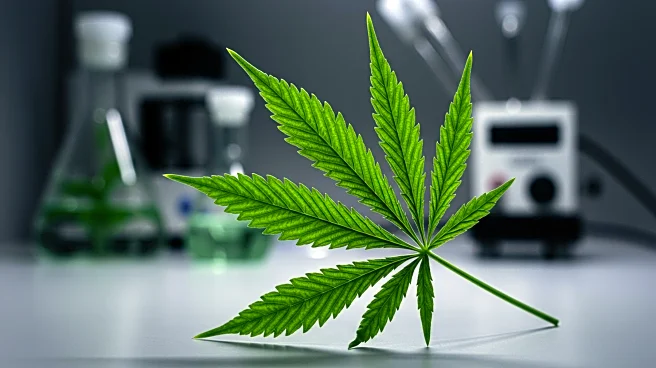What is the story about?
What's Happening?
Analytical chemists from Stellenbosch University have discovered a rare class of phenolic compounds, known as flavoalkaloids, in cannabis leaves. This marks the first evidence of such compounds in cannabis, highlighting the plant's complex chemical profile. The research identified 79 phenolic compounds across three strains of cannabis grown commercially in South Africa, with 25 compounds being reported for the first time in cannabis. Sixteen of these were tentatively identified as flavoalkaloids, primarily found in the leaves of one specific strain. The study utilized advanced analytical methods combining two-dimensional liquid chromatography and high-resolution mass spectrometry to characterize these compounds. The findings were published in the Journal of Chromatography A.
Why It's Important?
The discovery of flavoalkaloids in cannabis leaves underscores the plant's potential for medicinal applications beyond its well-known cannabinoids. Phenolic compounds, including flavonoids, are valued in the pharmaceutical industry for their antioxidant, anti-inflammatory, and anti-carcinogenic properties. This research suggests that cannabis leaves, often considered waste, may hold significant biomedical potential due to their unique non-cannabinoid phenolic profile. The study opens new avenues for exploring the medicinal benefits of cannabis, potentially leading to novel treatments and therapies.
What's Next?
Further research is likely to focus on the detailed characterization and potential applications of these newly discovered flavoalkaloids. Scientists may explore the biomedical implications of these compounds, assessing their efficacy and safety in various therapeutic contexts. The study could also prompt a reevaluation of cannabis plant material, encouraging its use in pharmaceutical research and development. As the understanding of cannabis's chemical complexity grows, stakeholders in the medical and pharmaceutical industries may invest in exploring its untapped potential.
Beyond the Headlines
The discovery of flavoalkaloids in cannabis leaves may influence the cultural perception of cannabis, shifting the focus from its psychoactive properties to its broader medicinal potential. This could lead to changes in regulatory policies, encouraging more comprehensive research into cannabis's non-cannabinoid compounds. Additionally, the findings may stimulate interest in sustainable practices, utilizing cannabis leaves as a valuable resource rather than discarding them as waste.
















